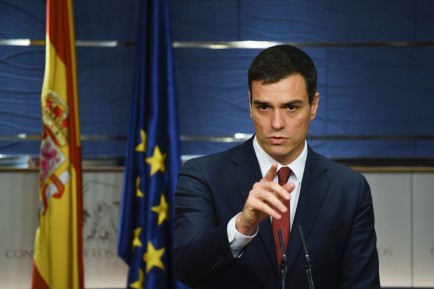
Although Socialists’ leader Pedro Sánchez fears a third election, he has pretty much ruled out giving his backing or support to the PP.
Spaniards are renowned for their easy going ways and innate ability to get on with things. When the going gets tough, the Spanish power on. When the summer crowds arrive, they smile more broadly than ever. And when the mercury tops 40ºC, they seek out shade, sangría and their friends to enjoy themselves just that little bit more…
Which is perhaps why many Spaniards feel such a strong disconnect with their politicians. Since December last year the country’s leaders have been unable to agree upon just who should run the country, forcing a second election last month in which, well, not much changed.
There was a glimmer of hope a few days after June’s election, with incumbent Prime Minister Mariano Rajoy emboldened by the fact that his People’s Party (PP) had managed to increase its share of the votes, largely at the expense of the far-left Podemos party.
However, on Wednesday the leader of the second-largest party, the Socialists, threw a spanner in the works by declaring that it will vote against Rajoy as a prime ministerial candidate – just as Rajoy was limbering up for another tilt at the job he has held since 2010.
Socialist leader Pedro Sánchez had already ruled out – as expected – a ‘Grand Coalition’ between the PP and the Socialists, even though he had previously stated that he would do “whatever it takes” to avoid a third election in the space of a year. Evidently, the prospect of sidling up to the centre-right PP was not an appealing one for him.
Rajoy has been spending his time since the last election trying to convince leaders of the smaller parties to club together to form a coalition with the PP, but is finding the going tough – largely because much of Spain’s smaller parties exist purely to challenge the might of the PP, not to jump into bed/government with them.
The alternative at this stage would be for the Socialists, which won the second-largest amount of votes in both recent elections, to form a coalition with liberal party Ciudadanos and Podemos. However, Ciudadanos garnered the fourth-most amount of votes in July – just 32 seats – and thus do not have a great deal of clout.
Adding to the Socialists’ woes was the news that Ciudadanos leader Albert Rivera said that his party would abstain in a confidence vote for a conservative government, basically saying it would not seek to stand in the way of the PP should they harvest enough support.
“We have to find some way of unblocking this situation and we think a technical abstention is better than having a third election,” Rivera said. “I hope other parties can do the same.”
A Ciudadanos abstention would leave the PP in the position of having to find 23 additional seats of support to add to the 137 they won in the election in order to secure parliamentary majority. A Socialist abstention would hand the election to the PP – but that is unlikely to happen, at least if Sánchez’s words are anything to go by.
Which leaves Spain pretty much where it was in December last year. Albeit with an improved economy, more jobs, and a more positive growth outlook. Perhaps this deadlock is not such a bad thing after all…
 en
en



 Vlaams-Nederlands
Vlaams-Nederlands
0 Comments
Leave a Comment
DISCLAIMER
The opinions and comments expressed by contributors to this Blog are theirs alone and do not necessarily reflect the views of VIVA Homes Under the Sun Ltd, any of its associated companies, or employees; nor is VIVA to be held responsible or accountable for the accuracy of any of the information supplied.
Have you got something to say?